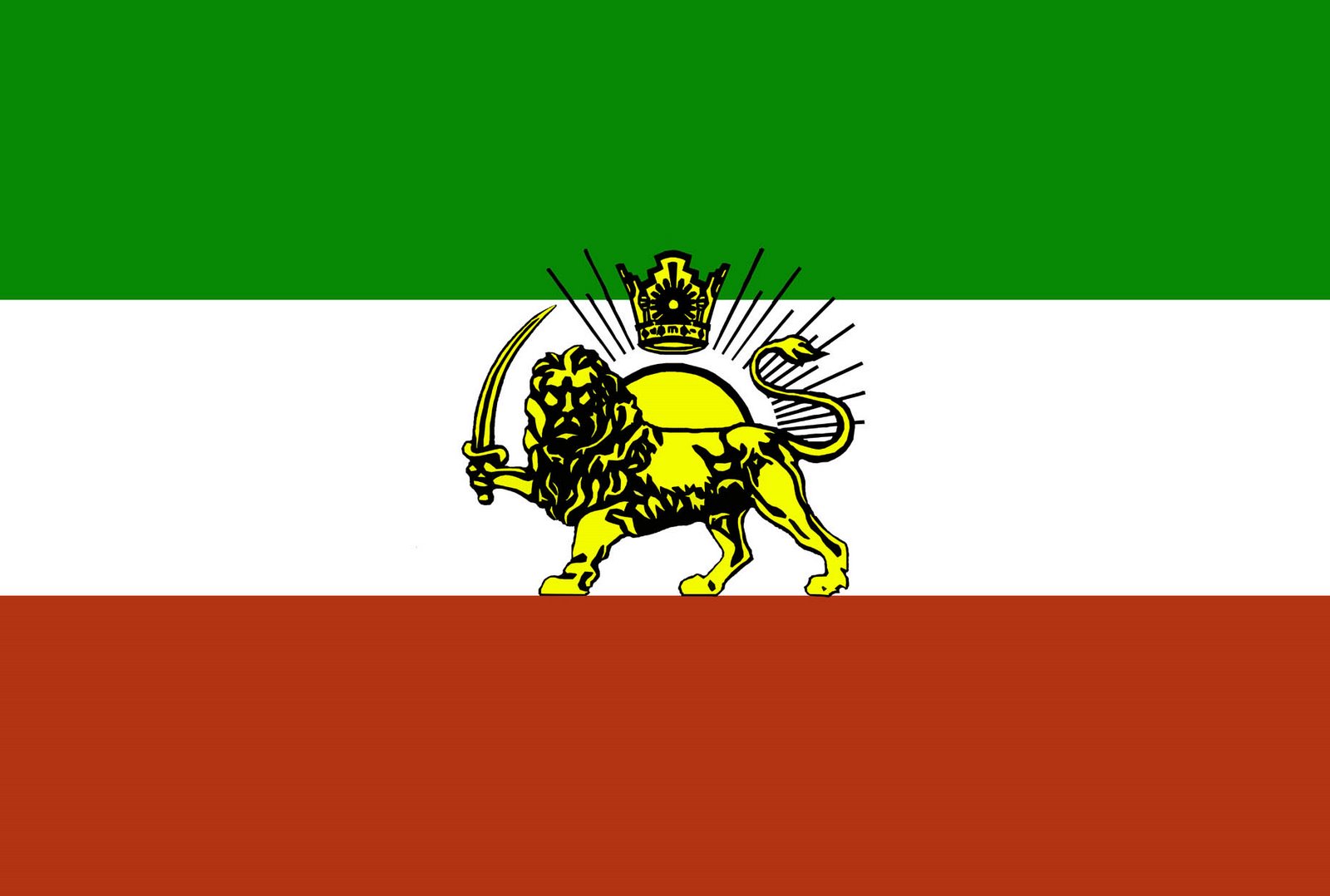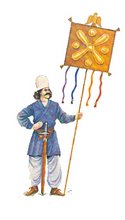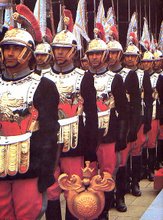A message of support to the Iranian people from a Portuguese boy:
Tuesday, January 26, 2010
Message of support...
Labels:
Aryamehr,
Iran,
Iranian,
lisbon,
monarchist,
Pahlavi,
portugal,
portuguese,
Shah,
Shahanshah
Sunday, January 24, 2010
Why did certain Iranian revolt against the late Shah of Iran...
I just wanted to share this excerpt from a compatriot on the topic of "why some Iranians revolted against the late Shah of Iran". Certainly this doesn't discuss all the factors but it has touched upon a few very important factors as to why a large portion of those who took to the streets in 1979 participated in a national mass-suicide - jelousy, greed, political naivety and sheepish mentality!
"...if the University professors [the enlightened class - in persian: "roshanfekran"] all 'saw' Khomeinis image in the moon, its because we Iranians are a bunch of sheep, we follow whats 'in vogue' I have interviewed hundreds of so called 'educated' iranians and they all say that they went out and shouted ' margh bar Shah' ['death to the shah'] not becuase they were unemployed, hungry or destitute (ingredients for a revolution) but ONLY beacuse everyone else did it!!! and why did everyone else do it?? beacuse we iranians are born 'Hasood' [jelous] we hated the Shah because he had prestige, he spoke 3 languages, he had a beautiful wife and he had Grace and style and he loved being Iranian and loved Iran!! The sad part was that we all had and felt the same thing (except the wife maybe!!) but we still opted to go out and support a Goat in place of a graceful peacock!! and now all of us have reached 'goh khori' [persian expression literally meaning "eating your own shit"]! Our women are being sold to Afghans and Arabs as sex slaves, our economy in tatters, our prestige destroyed and as a result we are all refugees in far away countries calling ourselves 'Persians' rather than Iranians because of how much the term IRanian has turned deragotory thanks to our Ayatollahs! We all ran away and ass kissed everyone to get foreign passports (me included) when the Iranian passport was one of [a] few in the world that was accepted visa free almost globally! Thanks to who?- THE SHAH, whom all of us , even the so called 'educated' one hated so much!
So pls lets all go back and continue looking at the moon, hoping to see Khomeinis ass smiling in our face, thanking us for giving the Akhunds something they never had- Power, money and no accountability to anyone!!!...."
"...if the University professors [the enlightened class - in persian: "roshanfekran"] all 'saw' Khomeinis image in the moon, its because we Iranians are a bunch of sheep, we follow whats 'in vogue' I have interviewed hundreds of so called 'educated' iranians and they all say that they went out and shouted ' margh bar Shah' ['death to the shah'] not becuase they were unemployed, hungry or destitute (ingredients for a revolution) but ONLY beacuse everyone else did it!!! and why did everyone else do it?? beacuse we iranians are born 'Hasood' [jelous] we hated the Shah because he had prestige, he spoke 3 languages, he had a beautiful wife and he had Grace and style and he loved being Iranian and loved Iran!! The sad part was that we all had and felt the same thing (except the wife maybe!!) but we still opted to go out and support a Goat in place of a graceful peacock!! and now all of us have reached 'goh khori' [persian expression literally meaning "eating your own shit"]! Our women are being sold to Afghans and Arabs as sex slaves, our economy in tatters, our prestige destroyed and as a result we are all refugees in far away countries calling ourselves 'Persians' rather than Iranians because of how much the term IRanian has turned deragotory thanks to our Ayatollahs! We all ran away and ass kissed everyone to get foreign passports (me included) when the Iranian passport was one of [a] few in the world that was accepted visa free almost globally! Thanks to who?- THE SHAH, whom all of us , even the so called 'educated' one hated so much!
So pls lets all go back and continue looking at the moon, hoping to see Khomeinis ass smiling in our face, thanking us for giving the Akhunds something they never had- Power, money and no accountability to anyone!!!...."
Labels:
1979,
Iran,
Iranian,
Islamic Republic,
Islamic Revolution,
khomeini,
Pahlavi,
Shah,
Shahanshah
Friday, January 22, 2010
Thursday, January 21, 2010
Iranian women during the Pahlavi Era (pre-1979)
This short clip highglights the advances and progress of Iranian women during the Pahlavi Era. After the 1st Arabo-Islamic Occupation of Iran, Iranian women were degraded to a sub-human level by the Arabo-Muslim occupiers and confined to living under the veil. In 1936 Reza Shah the Great (1st Pahlavi Emperor) freed Iranian women from Islamic bondage by once and for all getting rid of the oppressive islamic covering which they had been confined to live under ("chador" literally means "tent"). Iranian women were practically present and contributing towards the nation's progress and prosperity in all sectors of society - education, industry, business all the way to the Imperial Armed Forces. Iranian women's rightful place in society - as equal citizens - was re-established by the Pahlavi Emperor's, as it once had been in the pre-Islamic Persian Empire when for example several Empresses had once ruled the Empire. Unfortunately all the advancements Iranian women gained under the Pahlavi Era were all lost with the coming of the 2nd Arabo-Muslim Occupation of Iran in 1979-Present, during which Iranian women are once again treated as second class citizens stripped of their human rights and dignity. This should not go withouth saying that today Iranian women are spearheading the Iranian freedom/democracy movement to liberate their country from this hell-sent Islamic Republic and its terrorist leaders.
Monday, January 04, 2010
HIM Reza Pahlavi II wants UN probe in Iran
AP Interview: Shah's Son Wants UN Probe in Iran
By THE ASSOCIATED PRESS
Published: December 31, 2009
PARIS (AP) -- The son of the deposed shah of Iran urged nations worldwide on Thursday to withdraw their ambassadors from Tehran to protest a relentless government crackdown on opposition demonstrators that resulted in at least eight deaths this week alone.
Reza Pahlavi, who has lived in exile since his father was toppled in the 1979 Islamic revolution, also appealed in a letter to U.N. Secretary-General Ban Ki-Moon for a U.N. investigation into human rights violations during the unrest.
In an interview with The Associated Press, Pahlavi equated the climate of the unrest in his homeland with the ''revolutionary atmosphere'' that preceded the fall of his father from the Peacock Throne 30 years ago, when the monarchy was replaced by an Islamic republic. The difference, he said, is that this time the people know what they want -- a secular democracy.
Pahlavi, like other members of the exiled opposition to Iran's clerical regime, is looking to play a role from afar as protesters brashly defy authorities in an increasingly tumultuous Iran.
In the letter Pahlavi urged the U.N. chief to press Iran to release those arrested and act to ''halt the intolerable and increasingly dangerous march of events.'' The letter was given to the AP Thursday.
At least eight people died during protests Sunday, and hundreds were arrested in the worst unrest since the aftermath of June's disputed presidential election.
Pahlavi said that recalling ambassadors would be a ''minimal but clear indication'' by U.N. member states of their support for the rights of Iranian citizens and objections to violations of these rights by Iranian authorities.
''What you see in Iran is of major proportions,'' Pahlavi said by telephone. Based in the United States, the 49-year-old former crown prince is currently in Europe. His exact location was not divulged for security reasons.
''I can equate it with the same kind of climate that existed toward the end of 1978, 30 years ago, which led to a revolutionary atmosphere which I think has been reached right now in Iran,'' he said.
Shah Mohammad Reza Pahlavi was overthrown Feb. 11, 1979. He fled Iran and wandered from country to country, ill with cancer and eventually died in Egypt in 1980. His son is based in Bethesda, Maryland, but often travels to France.
''The biggest difference is if yesterday the only focus was on bringing down the previous regime, while most people didn't quite know what it would end up like, this time people not only know what they don't want, which is the current regime, but they also know what they want,'' the shah's son said.
He said he believes the great majority want a secular democratic system to replace the clerical regime.
Pahlavi, like other exiled Iranian opposition figures, insists that the protest movement is not focused exclusively on leading figure Mir Hossein Mousavi or another top figure, Mahdi Karroubi.
Exiled groups, who themselves are unlikely to ever join forces, say they are in constant contact with well-placed sources inside Iran.
The head of the People's Mujahedeen Organization, Maryam Rajavi, said her group could rally behind Mousavi ''despite his past'' but only ''if he accepts distancing himself from the religious dictatorship.'' The Mujahedeen's Iraq-based army has been disarmed by U.S. soldiers. The group remains on the U.S. terrorist list.
''Change is under way in Iran. It will not stop until the regime has come to an end,'' Rajavi said by telephone.
The first president of the post-revolution Islamic Republic, Abolhassan Bani-Sadr, also living in France, is less optimistic.
''From a stand point of legitimacy, it (the regime) is over .... But it has three means that are interwoven in order to make this regime last: oil revenues, the forces of repression, and fear.''
For Pahlavi, who calls for civil disobedience, the current strife is a ''culminating moment.''
He contended that, unlike the bloodbath that accompanied the fall of his father, a peaceful transition is possible with even some of the security apparatus ''part of the solution.''
He claimed some members of the security apparatus have on occasion shown restraint toward demonstrators and what he called cooperation by refusing to follow orders to move in. Foreign journalists in Tehran were restricted from covering protests, and news media abroad have relied in part on video and reports from Iranian citizens.
Now, he said, they need an ''exit strategy'' so they can refuse to cooperate with the regime and even join with those seeking change.
It is not known how much weight various exiled opposition forces have inside Iran and, in the case of Pahlavi, how many people support the idea of a return to monarchy. However, Pahlavi says that is not his goal.
''This is not about me. I'm not here to advocate anything but ... freedom and democracy for the Iranian people at first and I've determined this as my unique mission in life.''
Still, he acknowledged that ''I carry on my shoulders the historic weight of an institution that I may potentially represent.''
By THE ASSOCIATED PRESS
Published: December 31, 2009
PARIS (AP) -- The son of the deposed shah of Iran urged nations worldwide on Thursday to withdraw their ambassadors from Tehran to protest a relentless government crackdown on opposition demonstrators that resulted in at least eight deaths this week alone.
Reza Pahlavi, who has lived in exile since his father was toppled in the 1979 Islamic revolution, also appealed in a letter to U.N. Secretary-General Ban Ki-Moon for a U.N. investigation into human rights violations during the unrest.
In an interview with The Associated Press, Pahlavi equated the climate of the unrest in his homeland with the ''revolutionary atmosphere'' that preceded the fall of his father from the Peacock Throne 30 years ago, when the monarchy was replaced by an Islamic republic. The difference, he said, is that this time the people know what they want -- a secular democracy.
Pahlavi, like other members of the exiled opposition to Iran's clerical regime, is looking to play a role from afar as protesters brashly defy authorities in an increasingly tumultuous Iran.
In the letter Pahlavi urged the U.N. chief to press Iran to release those arrested and act to ''halt the intolerable and increasingly dangerous march of events.'' The letter was given to the AP Thursday.
At least eight people died during protests Sunday, and hundreds were arrested in the worst unrest since the aftermath of June's disputed presidential election.
Pahlavi said that recalling ambassadors would be a ''minimal but clear indication'' by U.N. member states of their support for the rights of Iranian citizens and objections to violations of these rights by Iranian authorities.
''What you see in Iran is of major proportions,'' Pahlavi said by telephone. Based in the United States, the 49-year-old former crown prince is currently in Europe. His exact location was not divulged for security reasons.
''I can equate it with the same kind of climate that existed toward the end of 1978, 30 years ago, which led to a revolutionary atmosphere which I think has been reached right now in Iran,'' he said.
Shah Mohammad Reza Pahlavi was overthrown Feb. 11, 1979. He fled Iran and wandered from country to country, ill with cancer and eventually died in Egypt in 1980. His son is based in Bethesda, Maryland, but often travels to France.
''The biggest difference is if yesterday the only focus was on bringing down the previous regime, while most people didn't quite know what it would end up like, this time people not only know what they don't want, which is the current regime, but they also know what they want,'' the shah's son said.
He said he believes the great majority want a secular democratic system to replace the clerical regime.
Pahlavi, like other exiled Iranian opposition figures, insists that the protest movement is not focused exclusively on leading figure Mir Hossein Mousavi or another top figure, Mahdi Karroubi.
Exiled groups, who themselves are unlikely to ever join forces, say they are in constant contact with well-placed sources inside Iran.
The head of the People's Mujahedeen Organization, Maryam Rajavi, said her group could rally behind Mousavi ''despite his past'' but only ''if he accepts distancing himself from the religious dictatorship.'' The Mujahedeen's Iraq-based army has been disarmed by U.S. soldiers. The group remains on the U.S. terrorist list.
''Change is under way in Iran. It will not stop until the regime has come to an end,'' Rajavi said by telephone.
The first president of the post-revolution Islamic Republic, Abolhassan Bani-Sadr, also living in France, is less optimistic.
''From a stand point of legitimacy, it (the regime) is over .... But it has three means that are interwoven in order to make this regime last: oil revenues, the forces of repression, and fear.''
For Pahlavi, who calls for civil disobedience, the current strife is a ''culminating moment.''
He contended that, unlike the bloodbath that accompanied the fall of his father, a peaceful transition is possible with even some of the security apparatus ''part of the solution.''
He claimed some members of the security apparatus have on occasion shown restraint toward demonstrators and what he called cooperation by refusing to follow orders to move in. Foreign journalists in Tehran were restricted from covering protests, and news media abroad have relied in part on video and reports from Iranian citizens.
Now, he said, they need an ''exit strategy'' so they can refuse to cooperate with the regime and even join with those seeking change.
It is not known how much weight various exiled opposition forces have inside Iran and, in the case of Pahlavi, how many people support the idea of a return to monarchy. However, Pahlavi says that is not his goal.
''This is not about me. I'm not here to advocate anything but ... freedom and democracy for the Iranian people at first and I've determined this as my unique mission in life.''
Still, he acknowledged that ''I carry on my shoulders the historic weight of an institution that I may potentially represent.''
Labels:
Azadi,
ban ki-moon,
democracy,
freedom,
Iran,
Iranian,
Pahlavi,
Reza Pahlavi II,
secularism,
Shah,
Shahanshah,
UN
Saturday, January 02, 2010
Subscribe to:
Comments (Atom)























